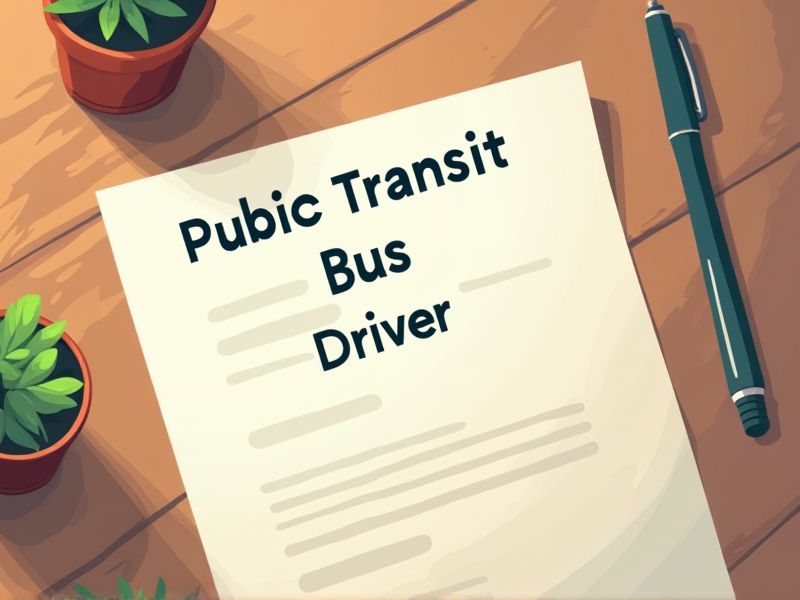
Public transit bus drivers are entrusted with the safety and efficient transportation of numerous passengers daily, necessitating a thorough understanding of both vehicular operation and public safety protocols. Certifications help ensure that drivers possess the necessary skills for handling large vehicles under diverse traffic conditions. Regulatory bodies enforce certification requirements to maintain standardized levels of competence and safety in public transport systems. Some important certifications you may need for public transit bus driving are listed below.
Commercial Driver's License (CDL) with Passenger Endorsement
A Commercial Driver's License (CDL) with a Passenger Endorsement is required for public transit bus drivers to ensure they have the specialized skills necessary to safely transport passengers. This endorsement mandates additional training and testing to handle large passenger vehicles under varying traffic conditions. Obtaining the endorsement demonstrates the driver's knowledge of federal and state regulations and proper passenger safety procedures. Employing drivers with this credential enhances the overall safety standards and reliability of public transit systems.
Department of Transportation (DOT) Physical Examination Certification
The DOT Physical Examination Certification ensures that public transit bus drivers meet specific health standards to safely operate large vehicles. A medical certification can significantly reduce the risk of accidents attributed to health-related issues among drivers. By complying with federal regulations, the certification helps in maintaining public safety and trust in the transit system. Regular assessments also enable early identification of potential health problems, which can prevent long-term issues for both drivers and passengers.
Defensive Driving Certification
Defensive Driving Certification enhances a bus driver's ability to anticipate and respond to road hazards, reducing the likelihood of accidents. The training equips drivers with skills to protect passengers, pedestrians, and other road users, improving overall safety. Insurance companies may offer lower premiums for certified drivers, given their reduced risk profile. Public transit authorities often require certification to enforce a standard of safety and professionalism.
First Aid/CPR Certification
Public transit bus drivers encounter passengers who may experience medical emergencies, requiring immediate First Aid/CPR intervention. Certification in these skills empowers drivers to provide essential aid, increasing the chances of positive outcomes for affected individuals. Knowledge of First Aid/CPR ensures drivers respond calmly and efficiently, minimizing delays and potential risks during critical situations. Transit authorities prioritize these certifications to enhance passenger safety and promote a responsible public transportation system.
Bus Safety and Emergency Procedures Certification
Public transit bus drivers with certification in bus safety and emergency procedures tend to respond more effectively in critical situations, reducing the likelihood of accidents. Well-trained drivers ensure passenger safety, which can enhance public trust and increase ridership. Certified knowledge in emergency procedures can lower operational costs arising from accidents and related liabilities. This certification can improve the driver's career prospects and job security in the competitive transportation industry.
Driver Qualification Card Certification
Public Transit Bus Drivers need Driver Qualification Card Certification because it ensures they possess the required skills and knowledge to operate safely. It reduces the risk of accidents by verifying that drivers meet consistent training and health standards. Regulatory compliance is maintained, protecting the transit company from legal issues. The certification builds public trust, reassuring passengers about the driver's competency and the safety of their journey.
ADA Compliance Training Certification
Public transit bus drivers require ADA Compliance Training Certification to ensure they understand the legal responsibilities for accommodating passengers with disabilities, which helps prevent discrimination lawsuits. Proper training equips drivers with the skills to operate wheelchair lifts and ramps correctly, enhancing safety and accessibility for all passengers. Knowledge of ADA guidelines helps drivers to communicate effectively with individuals with disabilities, ensuring a more efficient and respectful service. Such certification fosters an inclusive transit environment, encouraging ridership among disabled individuals and promoting equitable access to transportation services.
Passenger Assistance Training Certification
Passenger Assistance Training Certification is crucial for public transit bus drivers because it equips them with the skills to safely assist passengers with disabilities. It leads to a decrease in accidents or injuries, thereby improving overall safety. Drivers learn effective communication techniques, enhancing service quality and passenger satisfaction. Certification ensures compliance with legal standards like the Americans with Disabilities Act (ADA).
Hazardous Materials Endorsement (if applicable)
The need for a Hazardous Materials Endorsement for public transit bus drivers arises when transporting certain materials, ensuring compliance with federal regulations. This endorsement equips drivers with the knowledge to manage and respond to potential hazardous material situations effectively. Accidents involving hazardous materials can lead to public safety risks, making specialized training essential. The endorsement acts as a preventive measure, reducing potential liabilities and promoting a safer transit environment.
Customer Service and Conflict Resolution Certification
The Customer Service and Conflict Resolution Certification enhances a bus driver's ability to communicate effectively with a diverse group of passengers, thereby reducing misunderstandings. Training in conflict resolution equips drivers with skills to de-escalate potentially tense situations, leading to improved safety for both passengers and drivers. The certification contributes to higher passenger satisfaction, fostering trust and encouraging more people to utilize public transit. Increased positive interactions between drivers and passengers can result in lower stress levels for drivers, which supports their overall job performance and retention.
Summary
When you, as a public transit bus driver, obtain additional certifications, your skillset broadens, enhancing driving proficiency and passenger safety. With increased qualifications, job opportunities and career advancement become more accessible. Passenger trust and satisfaction typically rise, as certified drivers contribute to more reliable transport services. The overall impact on public perception of transit systems can improve, fostering community support for public transportation initiatives.
